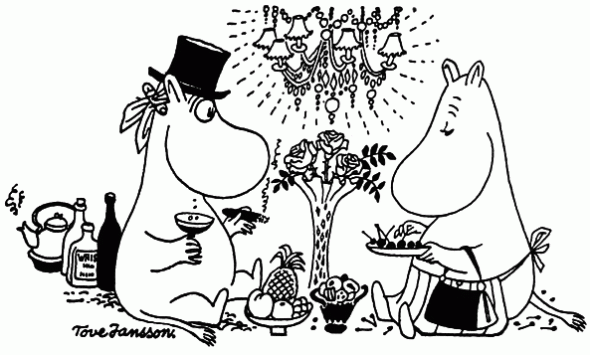Tag: translation
Tove Jansson meets Lewis Carroll
27 May 2011 | In the news
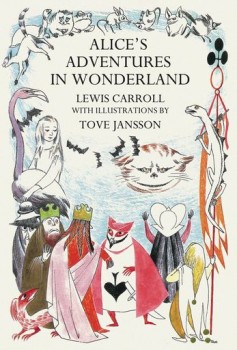 The British art museum Tate has recently reprinted two of Lewis Carroll’s books with illustrations by Tove Jansson, artist, writer and creator of the Moomins.
The British art museum Tate has recently reprinted two of Lewis Carroll’s books with illustrations by Tove Jansson, artist, writer and creator of the Moomins.
Tove Jansson (1914–2001) had begun to write and illustrate her Moomin stories for children in the late 1940s. In 1959 she was commissioned to illustrate the Swedish-language translation of Lewis Carroll’s The Hunting of the Snark (1874), about an ‘inconceivable creature’, the Snark, for the Finland-Swedish publisher Schildts.
After illustrating The Hobbit by J.R.R. Tolkien in 1962, Jansson then took on Carroll’s best-known book, Alice‘s Adventures in Wonderland, which was published in 1966 (see the pictures here).
The English-language original of Alice with her illustrations was then published in 1977 by Delacorte Press. Tate has now made Tove Jansson’s witty, perceptive visions of Alice available again, while the Snark with her original illustrations has now been printed in English for the first time.
Best Translated Book Award 2011
13 May 2011 | In the news
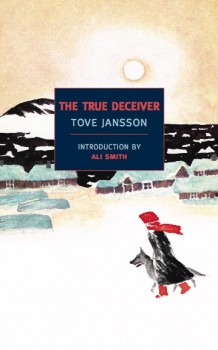 Thomas Teal’s translation from Swedish into English of Tove Jansson’s novel Den ärliga bedragaren (Schildts, 1982), entitled The True Deceiver (published by New York Review Books, 2009), won the 2011 Best Translated Book Award in fiction (worth $5,000; supported by Amazon.com). The winning titles and translators for this year’s awards were announced on 29 April in New York City as part of the PEN World Voices Festival.
Thomas Teal’s translation from Swedish into English of Tove Jansson’s novel Den ärliga bedragaren (Schildts, 1982), entitled The True Deceiver (published by New York Review Books, 2009), won the 2011 Best Translated Book Award in fiction (worth $5,000; supported by Amazon.com). The winning titles and translators for this year’s awards were announced on 29 April in New York City as part of the PEN World Voices Festival.
Organised by Three percent (the link features a YouTube recording from the award ceremony, introducing the translator, Thomas Teal [fast-forward to 7.30 minutes]) at the University of Rochester, and judged by a board of literary professionals, the Best Translated Book Award is ‘the only prize of its kind to honour the best original works of international literature and poetry published in the US over the previous year’. ‘Subtle, engaging and disquieting, The True Deceiver is a masterful study in opposition and confrontation’, said the jury.
Tove Jansson (1914–2001), mother of the Moomintrolls, story-teller and illustrator of children’s books, translated into 40 languages, began to write novels and short stories for adults in her later years. Psychologically sharp studies of relationships, they are written with cool understatement and perception.
Quality writing will work its way into a wider knowledge (i.e. a bigger language and readership) eventually… even though occasionally it may seem difficult to know where exactly it comes from; in a review published in the London Guardian newspaper, the eminent writer Ursula K. Le Guin assumed Tove Jansson was Swedish.
From the land of abundant reindeer…
17 March 2011 | This 'n' that

Rangifer tarandus, Finnish Lapland. Photo: Grand-duc (http://en.wikipedia.org/wiki/User:Grand-Duc)
Is Finland, a land of reindeer, ‘dense pine forests and deep snows’ also a ‘quiet literary landscape’?
Not exactly, as we at Books from Finland hope we are demonstrating. And over on the Bookslut website, Bonnie B. Lee comes to the same conclusion, after having mused about the reindeer (yes: in Helsinki you find tasty chunks of them in the freezer boxes of any foodstore) and reading three Finnish novels in English translation.
The novels Lee reviews are Purge by Sofi Oksanen (Puhdistus, 2008, translated by Lola Rogers, published last year), When I forgot by Elina Hirvonen (Että hän muistaisi saman, 2005, translated by Douglas Robinson, published in 2009) and The Year of the Hare by Arto Paasilinna (Jäniksen vuosi, 1975, first published in an English translation by Herbert Lomas in 1995, reprinted as a Penguin edition last year).
We have just entered the Year of the Rabbit, in recognition of which Paasilinna’s book (about a man who rejects his old life and goes roaming the wildernesses with a hare as his only companion) has appeared on the tables of large bookstores in the US. ‘The Year of the Hare is only the most Finnish, and perhaps most antically Zen-ish, of a shelf-load of books that tell us to find and live by our own ideas of contentment,’ said The Wall Street Journal.
The traumatic experiences of war and Finland’s deep forests are the common feature of these novels, Bonnie B. Lee finds. She also opines that ‘melancholy pervades the Finnish psyche’, and that ‘Finland vies with Hungary for highest suicide rate in Europe‘. Oh, but this latter is no longer true: number one on a World Health Organisation suicide rates list is Lithuania, followed by Hungary, Slovenia, Estonia and Latvia – Finland is number six.
Lee is clearly intrigued by her travels in contemporary Finnish literature. ‘The search for identity, a reckoning with a troubled past, and an outsider’s view looking in,’ she comments, ‘are all the stuff of great writing, and Finland is poised to continue to produce poignant and introspective literature that we can appreciate now that English translators have begun the work.’
Poignant and introspective or occasionally funny and fantastical, this is the work we try to offer an early glimpse of, in translation, at Books from Finland. Stay with us!
Winner of the Susan Sontag Prize
25 December 2010 | In the news
The Susan Sontag Foundation was established in New York in 2004 in memory of the celebrated author and cultural journalist Susan Sontag (1933–2004). The Foundation grants a prize to a young American who translates from other languages into English. In 2010 the prize was awarded for the third time.
Benjamin Mier-Cruz is currently pursuing his PhD in Scandinavian Languages and Literatures at University College Berkeley, with a particular interest in Finland-Swedish modernism and German expressionist poetry. His winning translation proposal is entitled Modernist Missives of Elmer Diktonius – Letters and Poetry of Elmer Diktonius.
Elmer Diktonius (1896–1961) was a rebellious Finland-Swedish avant-garde poet and composer, who was fluent in Finnish as well as his native Swedish. His letters to a wide range of European authors and critics, written between 1919 (the year of the Finnish Civil War) and 1951, reflect the political, artistic and personal developments in Finland and Europe.
The prize ceremony took place first in Helsinki on 5 November in a seminar at the Svenska litteratursällskapet i Finland (the Society of Swedish Literature in Finland), then at Scandinavia House, New York, on 12 November.
On the rocky road to a good translation
19 November 2010 | Essays, Non-fiction
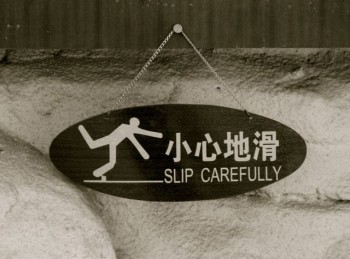
You get the picture? A translation error in China. Photo: Leena Lahti
Why just three per cent? Translator Owen Witesman seeks an explanation for the difficulties of selling foreign fiction to the self-sufficient Anglo-American market. Could there be anything wrong with the translations?
I am a professional translator, and I have a secret: I don’t read translations.
I’m not alone. The literary website Three Percent draws its name from the fact that only about 3 per cent of books published in the United States are translations (the figure for Germany is something like 50 per cent). There are various opinions about why this is, including this one from Three Percent’s Chad Post writing at Publishing Perspectives.
Why do I say it’s a secret that I don’t read translations? Because people expect me to read translations, as if as a translator it were my sacred duty to show solidarity with my professional community. Or maybe I can’t be cosmopolitan otherwise. More…
Little and large
5 November 2010 | This 'n' that
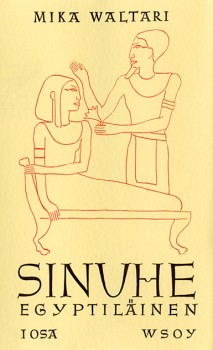
A Finnish tale set in Egypt: Mika Waltari's post-war novel has been translated into 30 languages, English in 1949
a about after again against all also always an and another any are around as at away back be because been before being between both but by came can children come could course day did didn’t do does don’t down each end er even every fact far few find first for from get go going good got great had has have he her here him his home house how i i’m if in into is it its it’s just kind know last left life like little long look looked made make man many may me mean me might more most mr much must my never new no not nothing now of off oh old on once one only or other our out over own part people perhaps place put quite rather really right said same say says see she should so some something sort still such take than that that’s the their them there these they thing things think this those though thought three through time to too two under up us used very want was way we well went were what when where which while who why will with without work world would year years yes you your
Doesn’t this just run like a poem? An extract from somebody’s stream of conscience? ‘…again against all also always… quite rather really right said’? Actually it’s a list of the 200 most used words of the English language in alphabetical order.
This remarkable list is among the references* in a new doctoral thesis from the Department of Modern Languages at the University of Helsinki, Englanniksiko maailmanmaineeseen? Suomalaisen proosakaunokirjallisuuden kääntäminen englanniksi Isossa-Britanniassa vuosina 1945–2003 (‘To world fame in English? The translating of Finnish prose fiction into English in Great Britain between 1945 and 2003’). More…
Prix Femina for Sofi Oksanen
5 November 2010 | In the news
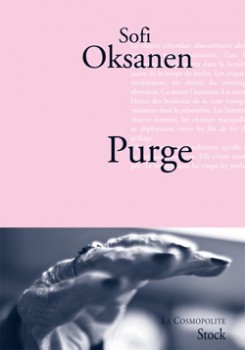 Sofi Oksanen’s novel Puhdistus (English translation, Purge, by Lola Rogers; French translation, also entitled Purge, by Sébastien Cagnoli), was awarded the French literature prize Prix Femina Étranger in early November.
Sofi Oksanen’s novel Puhdistus (English translation, Purge, by Lola Rogers; French translation, also entitled Purge, by Sébastien Cagnoli), was awarded the French literature prize Prix Femina Étranger in early November.
The Prix Femina was founded by the editors of the magazine La Vie heureuse (nowadays Femina) in 1904 as a counterbalance to the Prix Goncourt and the male-dominated award system. The jury members of Prix Femina are women only – whereas the prize can be awarded to either gender.
Among earlier winners of the Prix Femina Étranger – awarded since 1985 for the best foreign novel – are Amos Oz, Joyce Carol Oates and Ian McEwan.
The rights of Oksanen’s novel have so far been sold to 36 countries; Purge has sold approximately half a million copies the world over. In France – where the book also won the Le Prix du Roman Fnac in June – four print runs have sold more than 70,000 copies.
Translation prize
27 August 2010 | In the news
This year the Finnish Government Prize for Translation of Finnish Literature – worth € 10,000 – was awarded to the poet, translator, linguist and literary critic Rami Saari who translates into Hebrew.
Saari (born 1963) has studied and taught Hebrew, Semitic languages and Finno-Ugric Language Studies at universities in Helsinki, Budapest and Jerusalem. He has been the editor of the Israeli section of the international poetry website poetryinternational.org since 2002 and has edited a book series for Ha-kibbutz hameuchad which publishes predominantly Nordic and Baltic literature.
Saari, who has also published seven collections of his own poetry, now lives in Athens. He has also translated Albanian, Spanish, Catalan, Greek, Portuguese, Hungarian and Estonian fiction.
Among the Finnish writers Saari has translated are Daniel Katz, Eeva Kilpi, Eino Leino, Veijo Meri, Timo K. Mukka, Sofi Oksanen, Arto Paasilinna, Raija Siekkinen, Eeva Tikka, Sirkka Turkka and Mika Waltari.
Rami Saari received his award in Helsinki on 25 August from the minister of culture and sports, Stefan Wallin. The prize has been awarded by the Ministry of Education and Culture since 1975 on the basis of a recommendation from FILI – Finnish Literature Exchange.
French prize for Sofi Oksanen
26 August 2010 | In the news
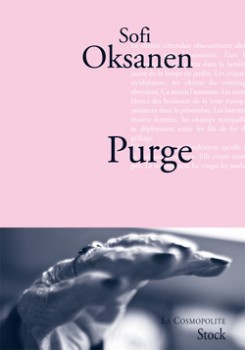 In August the ninth Prix du Roman FNAC was awarded to Sofi Oksanen (born 1977) for her novel Puhdistus (English translation, by Lola Rogers: Purge; see a recent British review [Guardian, August 21] here), to be published in French (by Editions Stock) on August 25 under the title Purge. This is the first time FNAC – the largest bookshop chain in France – has awarded the prize to an author who doesn’t write in French.
In August the ninth Prix du Roman FNAC was awarded to Sofi Oksanen (born 1977) for her novel Puhdistus (English translation, by Lola Rogers: Purge; see a recent British review [Guardian, August 21] here), to be published in French (by Editions Stock) on August 25 under the title Purge. This is the first time FNAC – the largest bookshop chain in France – has awarded the prize to an author who doesn’t write in French.
The jury consists of 900 booksellers and representatives from the general public. They read 300 novels published in France this year, and the winner was chosen out of 30 finalists.
The Finnish production company Solar Films Inc. will transform Puhdistus into a film in 2012: the screenwriter is Marko Leino.
Moomin food
19 August 2010 | In the news
A cookbook that introduces Tove Jansson’s famous Moomin family and other characters from the delightful classic stories for children (and adults), with original illustrations and quotations from the Moomin books, has been published in the UK.
Entitled Moomins’ cookbook. An introduction to Finnish cuisine (translated by David Hackston and published by SelfMadeHero), the book was compiled and written by Sami Malila and published in Finnish in 1993 (WSOY).
The Moomins are also currently being celebrated in an exhibition at the Design Shop UK in Edinburgh, entitled ‘And the World Went Mad for Moomins’. The exhibition runs until September 5.
Translations of books by Tove Jansson (1914–2001) have been published in more than 30 languages.
The cookbook offers recipes of healthy porridges and fish dishes, mushrooms and fresh berries, as well as treats like one of the Moomins’ favourites, pancakes (often cooked in the oven) with jam and whipped cream.
And as this is a cookbook for the whole family, Moominpappa’s grog contains no alcohol – but it’s no secret he enjoys a drop of good whisky (see the picture) every now and then, and a good cigar.
On stage in New York
28 May 2010 | In the news
Puhdistus (2007), a play by Sofi Oksanen that also became a award-winning novel (2008), will be produced at the prestigious La MaMa theatre in New York in February 2011 under the title Purge. The director is Zishan Ugurlu, La MaMa’s Artistic Director.
Next month, Purge will be read in Chicago where the conference of the Theatre Communication Group of American professional theatres takes place. In September the play – which is set in 20th-century Estonia – will also be prèmiered in Tartu, Estonia. The novel was published in Estonian translation last year. Purge was published in English this April by Grove/Atlantic, translated by Lola Rogers. So far translation rights have been sold to 28 countries.
The play has been translated into English by Eva Buchwald, dramaturge at the Finnish National Theatre, where Purge was first produced in 2007. No Finnish play has ever before been produced on a professional stage in the US.
Literature international
7 May 2010 | In the news
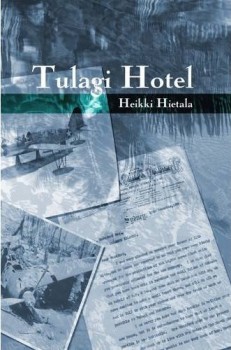 A novel set on the islands of the Pacific and Indian Oceans, Tulagi Hotel, was published by Dragon International Independent Arts (Diiarts) in London on 12 April. The writer is a native Finn, Heikki Hietala, who wrote his book in English.
A novel set on the islands of the Pacific and Indian Oceans, Tulagi Hotel, was published by Dragon International Independent Arts (Diiarts) in London on 12 April. The writer is a native Finn, Heikki Hietala, who wrote his book in English.
Hietala, a translator and lecturer at Haaga-Helia University of Applied Sciences in Helsinki, began writing his novel in 1996, and in 2008 a refined version was uploaded onto the HarperCollins website, Authonomy, where Tulagi Hotel rose to number 15 in the popularity ratings for novels – in a selection of some eight thousand. It is now available also in an electronic version for Kindle.
The story takes place in the years of the Second World War and after; a US Marine fighter pilot from the Midwest, Jack McGuire, settles down on the Solomon Islands and begins to run a hotel. The arrival of his wartime best friend’s widow, Kay Wheeler, disrupts his orderly civilian life.
We congratulate the author for his rare achievement – however, we’d like to point out a small error. Tulagi Hotel is advertised as ‘the first book written in English by a Finn to be published outside Finland’, this is not quite true, as Anselm Hollo, a native Finn, translator and poet living in Colorado, has been publishing poetry books in English in the UK and the US since the 1960s. (Here are samples of his poems:)
Prose prizes
7 May 2010 | In the news
This year’s Finnish Government Prizes for Literature and Translation have been awarded to, respectively, the writer and journalist (and former Editor-in-Chief of Books from Finland) Kristina Carlson (born 1949) and the translator Tarja Roinila (born 1964). The prizes, which are given on the recommendation of the Finnish National Council for Literature and are worth €15,000 each, were awarded at a ceremony in Helsinki on 4 May by the Minister of Culture and Sports, Stefan Wallin.
Carlson’s second novel, Herra Darwinin puutarhuri (‘Mr Darwin’s gardener’, Otava), published last autumn, is a taut, deep and rich story narrated by many voices, contrasting science and faith, solitude and community. ‘It is not often that a single work renews the novel form,’ remarked the jury. (We featured an interview with Carlson, as well as an extract from the novel here on the Books from Finland website last September.)
The translator Tarja Roinila has specialised in prose and poetry written in Spanish, French and German; her latest translations, of the linguistically complex novels of the Austrian author Thomas Bernhard, are extremely musical, the jury remarked.
On 4 May, which was celebrated in Finland as the Day of the Book and the Rose (this custom, which originally took place on St George’s Day, April 23, was born in Barcelona: originally men gave women roses, and received books in return), Kristina Carlson received the Kiitos kirjasta (‘Thanks for the book’) medal, awarded jointly by the Booksellers’ Association, the bookshop sales asistants’ association Libro and the Finnish Library Association.
American Girl goes America
12 February 2010 | In the news
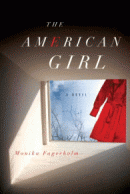 Monika Fagerholm’s novel Den amerikanska flickan has been published by the Other Press of New York.
Monika Fagerholm’s novel Den amerikanska flickan has been published by the Other Press of New York.
The American Girl was characterised by Publisher’s Weekly as ‘a hypnotic coming-of-age story that hinges on a dark but powerful bond between two Finnish girls growing up in the swamplands of outer Helsinki’. More…
Our favourite things
29 January 2010 | Letter from the Editors
Every reader has his or her favourite book. It is possible to define, with acceptable criteria, when a work of fiction is ‘a good novel’: do the plot, characterisation and language work, does it have anything to say? But when is a ‘good’ novel better than another ‘good’ novel? More…


